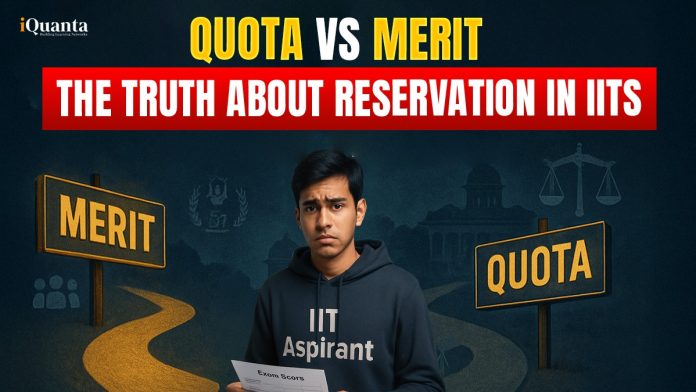The Indian Institute of Technology (IITs) are known for their competitive academics in the field of Engineering in India. Anyone can join IIT for the engineering program through the IIT JEE examination. Every year millions of engineering aspirants are preparing for the IIT JEE exam to secure a golden engineering seat in premier institutes like IITs, NITs and IIITs. However in this blog we will be talking for the truth about reservation in IITs.
Even many students and their parents ask about a question: does the reservations system include merit or is the current quota fair to everyone over there. Let’s talk about the real picture behind the reservation in IITs.

Join this free JEE Prep Group to Get Free Study Material, Preparation Strategy by Toppers, Latest Updates and More!
IIT Reservation Policy: Overview
The admission process in Indian Institute of Technology follows the reservation policies that are mandated by the Indian Government. The table mentioned below describes the current quota distribution of all IITs.
| Categories | Reservation Percentage |
| Scheduled Castes (SC) | 15% |
| Scheduled Tribes (ST) | 7.5% |
| Other Backward Classes (OBC-NCL) | 27% |
| Economically Weaker Sections (EWS) | 10% |
| Persons with Disabilities (PwD) | 5% (horizontal) |
Why Reservation in IITs Exists?
IIT reservation is actually not about giving seats to those students who cannot do work but the main reason behind is our history. Whatever historically disadvantaged people are given to the communities will also receive the equal opportunities and be able to study in the top engineering institutes in India. The main reason or idea behind the reservation in IITs is only here to fix the social injustice for people, gender or specially communities. It ensures that all candidates from all castes will receive the same quality of education.
But still reserved category students have to clear the toughest exam that is IIT JEE Advanced to meet the particular cutoffs. The only difference is that cut-offs are slightly lower to them but every student has to prove that they are able to understand the toughest IIT curriculum and survive there.
The Debate of Merit vs Reservation
The debate of merit vs reservation is a big debate topic and especially around statements like merit should decide admission but again it is also very important to understand the actual context behind this and why this is for the toughest competitive exam like IIT JEE.
In case of reservation in IITs students who are coming from the reserved category background still have to appear for the toughest exam that is IIT JEE and it is same for everyone but they are given slight relaxation in cutoffs for the reserved category candidates to balance the actual disadvantages that caused by the limited access to various things like education, coaching and other resources. The IIT reservation policy does not about eliminating opportunities for the general category students but in fact if i talk then over 40% seats are still unreserved and open to everyone.
Conclusion: IIT Reservation
The reservation in IITs is not about a compromise on merit but it is a step towards proper excellence. It is very important to cover high academics but it is equally important to recognize those candidates that have fewer opportunities due to systematic flaws. It is our responsibility to go for the true merit which includes background, and the ability to classify diversity in a positive manner.
Enroll to JEE 2026 Course

FAQs: Reservation in IITs
Q1: Do reserved category students also have to clear JEE Advanced examination?
Yes whether it is unreserved category or reserved category candidate, everyone has to appear for the JEE Advanced to get admission in top institutes like Indian Institute of Technology(IITs).
Q2: Does the reservation policy affects over quality of education in IITs?
No the reservation policy does not affects the overall education in IITs because IITs are very strict along with popular due to their tough curriculum for students.




